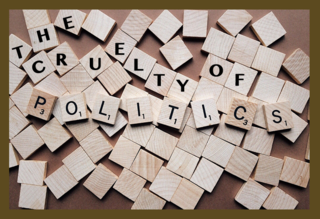Friends
When the Politics of Friends and Family Shocks You
How to deal with the cognitive dissonance and have the talk
Posted September 29, 2020
Key points
- Some friends sidestep tough topics while others double down and are susceptible to confirmation bias.
- Cognitive dissonance forces us to reckon with our own incongruent thoughts and behaviors.
- Many recent elections have left people gobsmacked and less hopeful about the human condition.
- Heels-into-the-sand loyalties speak to how differentiated we are from groupthink. Or perhaps not at all.
When Will MacAvoy, in HBO’s Newsroom, was asked why America is the greatest country, he tried to ignore the question. When pressed, he gave a riveting answer: America was not. He rattled off underperformance in literacy, math/science, life expectancy, and infant mortality.1
His soliloquy around the 2012 presidential election could easily happen today. Some sidestep hard topics. Others look in disbelief when respected friends back candidates and positions that intersect with cruelty, moral bankruptcy, and mistruths.

I know you consider us friends, but I’m confused how you can back those who can’t say ‘black lives matter?’ I worry what life could bring for me, my family with the racial divide, the violence we see. Is loyalty to party greater than speaking out and supporting friends?
No doubt the electorate has expanded its polarity. It makes us think of cognitive dissonance — having incongruent thoughts, attitudes, beliefs or behaviors that conflict in one's mind. Hesitancy, squirming and decisions result. In Overcoming Passive Aggression, a book about hidden anger, I made sure to discuss how mixed messages drive us crazy with the disparity between what’s been said, who people back or support politically.
In prior elections, we’ve accepted that candidates differed, yet never doubted love of country or commitment to responsibilities of the job sought or held. In Too Much and Never Enough, Mary Trump, Ph.D., talked of a closed family system where differentiating oneself met with punishment.3 It begs the question of whether lifelong party affiliation undermines individual autonomy. Groups like The Lincoln Project provide those with cognitive dissonance another path.
Your family stands for religious principles and helping the disadvantaged. Yet you support a candidate who committed adultery, demeaned women, mocked a disabled reporter, and ripped children from parents fleeing for a better life. I don't get it.

Charismatic leaders in religion and politics are nothing new. How easily our friends, whom we believe are educated and well-informed, get caught in a media bubble still baffles. "Illegitimate news," they’ll say, turning on the messengers. “But what about your candidate …” they’ll defend and deflect.
Some voters cast ballots for change. When they see something they don't like, they may double down or acknowledge it wasn't what they had in mind. In any disagreement allow others to save face.
Before or after elections, focus on activities that bond you as family and friends, away from the headlines. If you get mired, acknowledge change as a reasonable concept and give a little ground. Phrase sentences with “I messages,” steer clear of shaming or guilting and opt for The Golden Rule. Watch out for confirmation bias.
Why do you support a candidate who backs so many social programs? I worked hard for my money, pay my fair share of taxes and don’t want it just given away.
First a tweak because why questions and “you…” statements put people on defense. Try “how do you feel about,” “what brought you to back,” “help me to understand…” or “would you agree that…” to find common ground.
Steer clear of these igniters: gaslighting (words like “radical” or “fake”), contempt (name calling tops that list), and innuendo (suggesting nefarious or stereotypical behavior).
With any topic, think twice before judging people too harshly for their positions. Everyone has a story. Theirs may include social justice, advocacy, charity, and rehabilitation. You, your friends or family might all be correct but divergent in how to navigate life.
Decision making is highly personal, sometimes private. One never knows what path people have traveled, filled with traumas, tragedies or other hardships. Wonder to yourself: What happened in this person’s life to bring him or her to such a position? This thought shift might take the edge off of an intense argument, yet when you find yourself embroiled, ask "would you care to hear how this impacts my life?"
Differences over solving health care, caring for our planet, and navigating this pandemic, won’t disrupt my friendships. Human rights, abuses of power, gender equality, and respect for fellow citizens involve morality. Should I alert others where I draw the line?
Thomas Jefferson said, “I never considered a difference of opinion in politics, in religion, in philosophy, as a cause for withdrawing from a friend.”
In a world where coworkers cast judgment, relatives choose disinformation, and people catch spouses talking back to TV news, would Jefferson de-friend his detractors on Facebook or Instagram?
Since our country was built on forging alliances to accomplish the common good, it’s doubtful Jefferson would alter his stance. When you make the choice to cut off others and end all communication, you cease the ability to influence, inform, learn, and grow.
Becoming the change you want to see in the world doesn’t happen in isolation. Heaven knows this year we’ve had enough of that to span lifetimes.
Copyright @ 2020 by Loriann Oberlin, MS. All rights reserved.
When Politics Divides at Your Dinner Table




